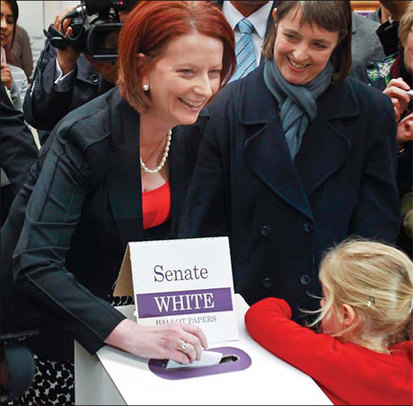Asia-Pacific
Australian political chiefs seek new allies
(China Daily)
Updated: 2010-08-23 08:00
 |
Large Medium Small |
CANBERRA - The leaders of Australia's two major political parties began negotiating power deals with independent lawmakers on Sunday after the nation's closest election in decades failed to deliver a clear mandate to govern.
 Australian Prime Minister Julia Gillard casts her vote at her electorate in Melbourne on Saturday. Mick Tsikas / Reuters |
Prime Minister Julia Gillard, who remains caretaker leader, said it was clear that no party had won a majority of parliamentary seats in Saturday's poll that delivered an extraordinary voter backlash against her center-left Labor Party after a single three-year term. Market analysts predicted the uncertainty would push the Australian dollar and stock market lower when trading resumed on Monday.
Gillard and Tony Abbott, leader of the conservative Liberal Party, said they had initiated talks with three independents in the House of Representatives as well as the Greens party in a bid to secure their votes in the House of Representatives. Neither revealed what they were prepared to offer in the confidential negotiations.
Labor and the opposition Liberal/National alliance were set for a dead heat of 73 seats each, falling short of the 76 needed for a majority in the 150-seat lower chamber, according to public broadcaster ABC.
"It's my intention to negotiate in good faith an effective agreement to form government," Gillard told reporters.
Abbott, a staunch Catholic who questions man's role in climate change, said the outcome showed Australians wanted new leadership.
"There was a savage swing against this government. It is historically unprecedented for a first-term government to receive the kind of rebuff that the Rudd-Gillard government received yesterday," Abbott said. "I think the public expects a change of government as a result."
University of Western Sydney analyst David Burchell said a hung parliament was the "nightmare scenario we all feared" and was unlikely to last longer than 18 months before deadlock brought it to collapse.
"Neither will be able to pass, I would have thought, a significant body of legislation other than budget bills," said Burchell.
"They would have to be negotiating with the independents and minorities - or most of them - probably every single time, and Los Angeles-style gridlock I guess is what would result."
Analysts say it could take up to two weeks for the final results in some close constituency battles to be known as postal votes are counted.



